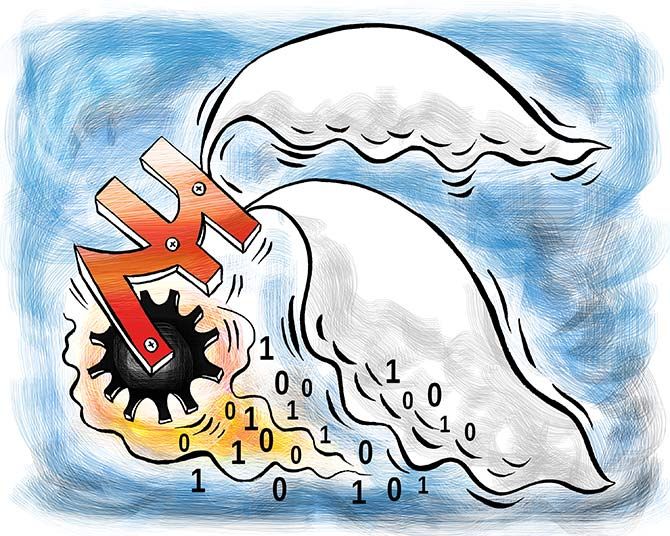Ajit Balakrishnan offers a< recipe for creating 100,000 plus angel investors in India.
Illustration: Uttam Ghosh/Rediff.com

Civil servants and politicians in India fervently murmur the word 'startups', just as they once used to murmur 'Ram, Ram', a signal of personal good intentions as well as a symbol of fervent hope that some wished-for event would come true.
They hope that somehow, that deity that they pray to, Lord Startup, will make young people its followers and take their attention away from looking for jobs and blaming them for not creating enough jobs.
Maybe it is time we paused a little from this fervent praying and examined what the startup game is all about.
To start with, is it just a fancy new word for any newly founded small business?
Is the term 'startup' used to describe only new businesses in the computer-related industries and not, for example, a new restaurant or a new kirana shop or a new real estate agent?
When a business family puts in the money for their son or daughter to set up a new business, does that amount to a startup?
Does starting a machine shop, which does machining on a contract basis, amount to a startup?
In other words, does the word startup mean only some specific types of new businesses and not all new businesses?
To even start to answer such questions, we have to ask some more fundamental ones: Are entrepreneurs (the ones who launch startups) born or made?
Are the successful ones mostly in their 20s?
Does a higher education degree help or hinder a startup entrepreneur?
Vivek Wadhwa, an NRI entrepreneur who has spent some years studying and reflecting about some issues, has this to say about entrepreneurs in America: The majority, 52 per cent, of Silicon Valley entrepreneurs were the first in their immediate families to start a business.
He further points to cases of Mark Zuckerberg, Steve Jobs, Bill Gates, Jeff Bezos, Larry Page, Sergey Brin, and Jan Koum and says that 'they didn't come from entrepreneurial families. Their parents were dentists, academics, lawyers, factory workers, or priests.'
And contrary to the impression that people in their 20s are the ones who do successful startups, he points out that Marc Benioff was 35 when he founded Salesforce.com, Reid Hoffman was 36 when he founded LinkedIn. Steve Jobs's most significant innovations at Apple -- the iMac, iTunes, iPod, iPhone, and iPad -- came after he was 45.
The biggest obstacle that a startup entrepreneur faces in India is the drought in early stage capital providers or angel investors as they are called in the trade -- the ones who can provide the first Rs 50 lakh to Rs 1 crore that will enable an entrepreneur to build a working proto-type of his product and test it with the first handful of customers.
Such funding works even better if it comes from a person who can also connect the young entrepreneur to his first few customers.
The way our tax laws are framed, angel investors find it impossible to set-off the startup's early losses against their income.
Enabling this is a simple matter of making a minor change to section 10(2A) of the Income Tax Act as it applies to Limited Liability Partnerships firms, but unfortunately there is no trade body that is ready to lobby for this simply because most trade associations are dominated by family businesses which do not have a need for startup funds. Their families provide it to them.
Even the National Skill Development Corporations funding documents says that 'NSDC will prefer to provide funding in the form of a loan', and that the 'promoter contribution shall be to the tune of minimum 25 per cent of the investment requirement.'
What's more, the 'principal moratorium shall be for a period of three years, No moratorium shall be granted on interest'. Read this together with the finding that 90 per cent of startups fail, it is suicidal for an entrepreneur to accept funding on such terms.
A second aspect about startups that is ignored by our policymakers is that a startup by definition has to work in an emerging technology area, not a technology area which has been around for so long that it has become commoditised.
Yet, if you see the list of skills being promoted by the central government and the many state governments, it is clear that none of those skills can be the foundation for a startup today. Any startup concept today has to have a heavy dose of Data Science and Machine Learning.
To answer a question we posed in the beginning, yes, doing a startup is different from starting a restaurant, a kirana shop or a real-estate business.
The term startup means an entrepreneur who has a business idea which involves use of advanced technology, which in our current age means some combination of computer/Internet/data science/machine learning/bio technologies, and who is setting out to create entirely new ways of solving problems which the common man in India faces in his daily life.
Such startup entrepreneurs most likely will be in their 30s or early 40s, may possibly have parents who are doctors, lawyers, academics and not themselves businessmen.
And the capital to start such enterprises has to come as no-strings-attached risk capital from angel investors; that in turn will happen only if we make it tax-efficient for angel investors with domain expertise to make such investments.
Just imagine an India with a hundred thousand angel investors on the hunt for startup entrepreneurs!
Ajit Balakrishnan, chairman and CEO of Rediff.com, is the author of The Wave Rider, a Chronicle of the Information Age; He can be contacted on ajitb@rediffmail.com










 © 2025
© 2025